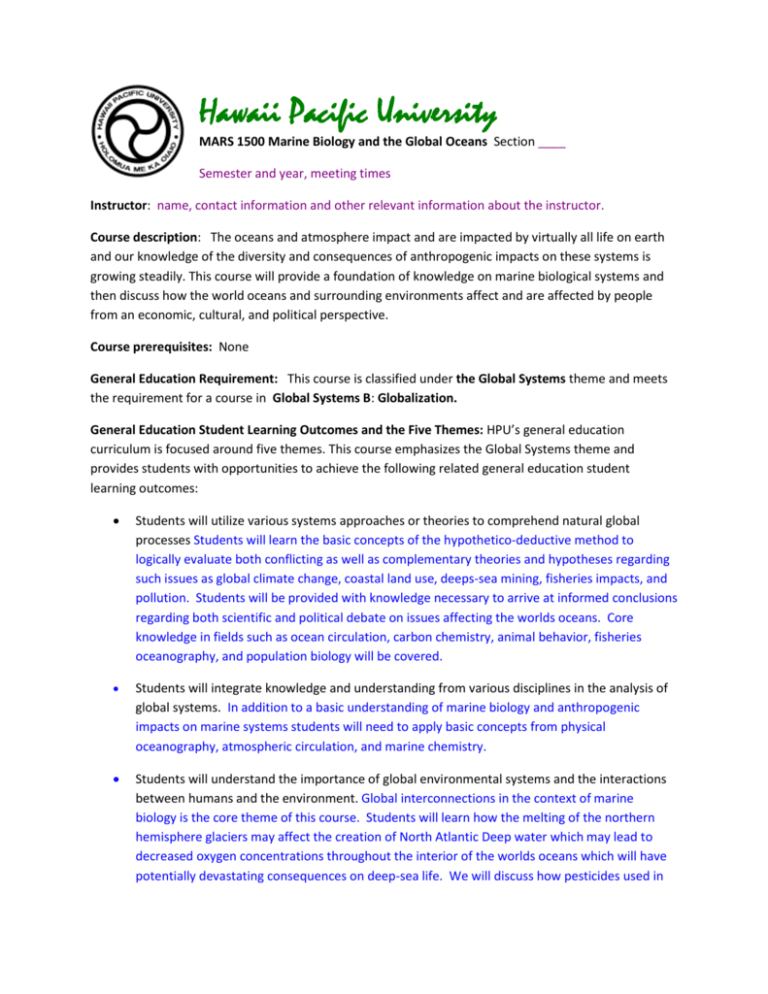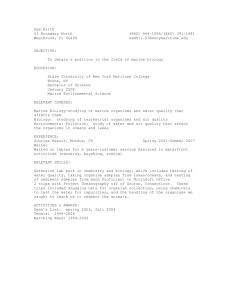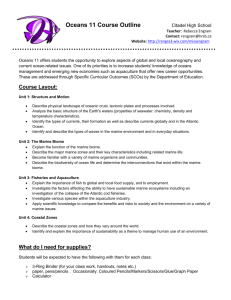Hawaii Pacific University
advertisement

Hawaii Pacific University MARS 1500 Marine Biology and the Global Oceans Section ____ Semester and year, meeting times Instructor: name, contact information and other relevant information about the instructor. Course description: The oceans and atmosphere impact and are impacted by virtually all life on earth and our knowledge of the diversity and consequences of anthropogenic impacts on these systems is growing steadily. This course will provide a foundation of knowledge on marine biological systems and then discuss how the world oceans and surrounding environments affect and are affected by people from an economic, cultural, and political perspective. Course prerequisites: None General Education Requirement: This course is classified under the Global Systems theme and meets the requirement for a course in Global Systems B: Globalization. General Education Student Learning Outcomes and the Five Themes: HPU’s general education curriculum is focused around five themes. This course emphasizes the Global Systems theme and provides students with opportunities to achieve the following related general education student learning outcomes: Students will utilize various systems approaches or theories to comprehend natural global processes Students will learn the basic concepts of the hypothetico-deductive method to logically evaluate both conflicting as well as complementary theories and hypotheses regarding such issues as global climate change, coastal land use, deeps-sea mining, fisheries impacts, and pollution. Students will be provided with knowledge necessary to arrive at informed conclusions regarding both scientific and political debate on issues affecting the worlds oceans. Core knowledge in fields such as ocean circulation, carbon chemistry, animal behavior, fisheries oceanography, and population biology will be covered. Students will integrate knowledge and understanding from various disciplines in the analysis of global systems. In addition to a basic understanding of marine biology and anthropogenic impacts on marine systems students will need to apply basic concepts from physical oceanography, atmospheric circulation, and marine chemistry. Students will understand the importance of global environmental systems and the interactions between humans and the environment. Global interconnections in the context of marine biology is the core theme of this course. Students will learn how the melting of the northern hemisphere glaciers may affect the creation of North Atlantic Deep water which may lead to decreased oxygen concentrations throughout the interior of the worlds oceans which will have potentially devastating consequences on deep-sea life. We will discuss how pesticides used in the Northern Hemisphere end up in Antarctic seals, how we can trace the incorporation of carbon isotopes from the first atomic explosions in deep ocean waters, and many more humanglobal ocean interactions. Students will recognize some of the roles that international organizations and transnational ideas and movements play in world societies. Students will independently and in groups research international treaties of the sea with particular emphasis on regional treaties and organizations such as the International Whaling Commission and the Inter-American Tropical Tuna Commission. They will also through in-class presentations initiate discussions on international environmental organizations. Students will understand the impact of the process of globalization from a historical or cultural perspective. This outcome will be approached from 1) a social justice perspective (aboriginal rights vs. modern societal mores and fisheries management) and 2) a technological development perspective ( For example prior to our knowledge of the problem of introduced species practices thought to be benign were responsible for altering entire ecosystems). Purple text shows places where specific course information must be filled in. Red text provides explanatory notes to the instructor which should be deleted before using the syllabus. Blue explanations above may be rephrased by the individual instructor to reflect the specific approach in that section. Student Learning Outcomes for MARS 1500 Marine Biology and the Global Oceans By the end of this course students with 1) sufficient mental faculties (see last page), 2) proper preparation, 3) adequate time, and 4) honest effort are expected to: Describe the scientific method and employ it to distinguish between scientific and pseudoscientific arguments. Be familiar with the major marine biomes and the important physical and chemical conditions impacting their inhabitants Discuss the physical and biological factors that can influence the distribution and abundance of marine species Describe community dominants and keystone species from major ecosystems of the worlds oceans Compare mixing processes in the oceans and atmosphere and relate how anthropogenic inputs to those systems over various time scales Describe how coastal development can impact both coastal and oceanic marine populations and how these impacts can affect economies of indigenous populations. Discuss the impacts of fossil fuel burning on marine species distributions and abundances through changes in global temperature and carbon chemistry of seawater. Examine how depletion of great whale stocks has impacted deep-sea communities, other cetacean species, pinnipeds, and their prey populations. Understand the benefits and costs of aquaculture in terms of its impacts on global economies, global protein production, local environments, and local stakeholders in the marine environment. Identify and describe relevant international treaties regarding exploitation of the marine environment. Discuss the objectives of relevant environmental non-governmental organizations and to what degree they base their objectives/arguments on robust scientific knowledge. Compare historical and current fisheries practices and discuss the cultural and moral basis of fishing rights claimed by indigenous peoples. Student learning outcomes will be evaluated using in-class discussions, student presentations, examinations which will include essay and short answer questions and other traditional types of questions. For the rest of these required syllabus items see the details in the faculty handbook. Delete this note once the syllabus is complete. For online courses there are some additional requirements given at this link. Texts List textbooks with ISBN’s and include this language as well All textbook information (pricing, ISBN #, and e-books) for this course can be found on the HPU Bookstore website: hpu.edu/bookstore. If you have any questions regarding textbooks, please contact the HPU Bookstore at: Phone: 808-544-9347 Or e-mail: jyokota@hpu.edu mmiyahira@hpu.edu Assignments and mode of evaluation Summary of important dates and deadlines (if the schedule is a separate document and due dates are not given with the description of the assignments). Class rules and policies (including regarding attendance, late work and academic dishonesty) Schedule of events (may be attached separately)








